by Henry Tempelman, Pharmacist/Owner of Evergreen Pharmacies
A few updates regarding COVID vaccinations in Ontario and how that relates to you and our pharmacy services. Our pharmacies were only assigned Moderna vaccines from the Ministry thus far, but ordering the Pfizer vaccine is now available to us so starting September we will now have Moderna Vaccine days and Pfizer vaccine days at each of our locations. Although mixing and matching the interchangeable mRNA vaccines (Pfizer and Moderna) has proven to be safe and effective for adults, getting the Pfizer vaccine is important for us so that we can provide COVID vaccine services to children ages 12-18 (Moderna vaccine has only been approved for ages 18+). Further to children and COVID vaccines, the Ontario government announced that any child turning 12 in 2021 is eligible to get the vaccines; basically, anyone born anytime in 2009 or earlier is eligible to receive their Pfizer COVID vaccine.
We’ve been starting to get questions about booster doses/third doses for the COVID vaccine as well. At the time of writing, there is only a limited population that is eligible for booster doses of the COVID vaccine in Ontario, which falls in line with recommendations from the CDC. (Contrary to the announcement in the US recently where all American adults that received two doses of the COVID vaccine are eligible to get their third dose 8 months after the second dose.) In Ontario, eligible populations for third doses include transplant recipients, patients with hematological (blood) cancers and on chemotherapy or patient with certain treatment regimens (Anti-CD20 medications) and residents of higher risk congregate settings (long-term care homes, higher risk licensed retirement homes and First Nations elders’ lodges). Transplant recipients, patients with hematological cancer and receiving the abovementioned treatments are eligible to receive their 3rd dose 8 weeks after their 2nd dose. Residents living in higher risk settings are eligible to receive their 3rd dose 5 months after receiving their 2nd dose.
At the time of writing, our Ontario Pharmacist Association is awaiting further direction from the Ministry of Health on the process for administering 3rd doses in pharmacies (ie. Will there be a requirement of a letter from the patinet’s primary care provider or specialist to confirm whether they meet the criteria?) We will be sure to update via our email newsletter (you can sign up on our website at www.evergreenrx.ca), our facebook page or in store as we get updated!
Still haven’t got your COVID vaccine? Hesitant about it effectiveness or safety? Being hesitant or anxious about something like this is okay! What’s important is that you are making a decision based on GOOD information to overcome your hesitancy. At this point in the vaccine journey, we not only have great studies pointing towards their effectiveness and safety, but now we have real world experience in giving them to hundreds of millions of people over the last 9 months to affirm their safety. Everything in medicine has risks and whether it be a vaccine or a new blood pressure pill, we are always weighing the benefits vs the risk. COVID is real and serious, and the risks of the virus will always trump the risk of the vaccine. The vast majority of COVID hospitalizations are persons who are unvaccinated, and a smaller portion of hospitalizations are those who are partially vaccinated (1 dose). Yes, you can still get COVID if you are double vaccinated, but it is extremely unlikely for it to result in severe infection/hospitalization; the vaccine gave your body the instructions on how to fight the infection as it entered your body so it doesn’t progress to serious symptoms vs an unvaccinated person where an infecting virus has a chance to further infiltrate the body’s defense mechanisms before the immune system can come up with a strategy to fight the infecting virus. Unvaccinated persons are also at risk for COVID long haul symptoms, which can have a significant impact on your day-to-day life.
Do you have kids going back to school in the eligible age ranges for vaccinations? I understand it can be difficult to decide for your child to get a vaccine that is new, with all the information out there. It is not true that COVID can’t result in serious illness for a child and the best thing you can do for your child is vaccinate them as soon as you are able to in order to maximize protection during return to school. In teens, it seems that the COVID vaccine carries a very small risk of myocarditis (heart muscle inflammation), to the tune of 50 cases per million doses given for boys and 12 cases per million doses given in girls. These symptoms are typically mild and resolve in 1-2 weeks. Teens who are infected with COVID get myocarditis at a much higher incidence 500-3000 cases per million infections. COVID infection risk outweighs the risk of the vaccine and it’s not even close.

